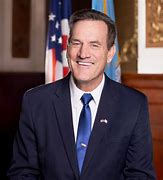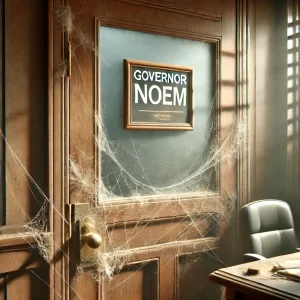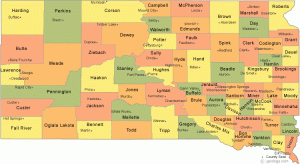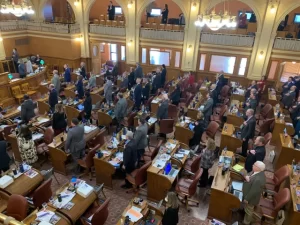Our new Governor represents a welcome return to normalcy in state government. My hope is that he, along with those considering running for the office next year, will begin addressing the systemic issues that have long plagued South Dakota.

Governor Rhoden
A Temporary Tenure
South Dakota has just emerged from a very odd time in its history marked by absent and inattentive leadership. Governor Rhoden appears eager to return state operations to normal—an encouraging development.
However, he has only 16 months before a new leader emerges from the Republican primary in June 2026. His performance in the coming months could position him as a strong contender in that race.
Longstanding Issues
South Dakota faces deep-rooted challenges that have been ignored for years. Ideally, these issues will become focal points in the 2026 election.

But since these are tough topics, I am skeptical. Politicians often avoid discussions about fundamental, disruptive change. Political careers are safer when focused on maintaining the status quo. True leadership, however, requires courage.
Here are some systemic issues that our leaders—and those aspiring to lead—should address.
Missed Opportunities for Consolidation
South Dakota is burdened with excessive infrastructure, including redundant layers of government that waste taxpayer dollars. We have too many counties, school districts, and publicly funded universities, yet no serious discussions are happening about consolidation. The inefficiency is staggering.

66 Counties in South Dakota
The Myth of Small Government
We pride ourselves on being a “small government” state. Yet, state government is one of South Dakota’s largest employers, ranking third behind two major healthcare systems. The question is not whether government is big, but whether it is operating efficiently. The answer is unclear.
A Remote and Isolated State Capitol
Many key state departments are headquartered in Pierre, far from South Dakota’s population centers. Managers and employees are recruited from a limited pool of long-time residents. Hiring qualified professionals—particularly those with national or even regional experience—is nearly impossible under these circumstances.
As a result, some aspects of state government function more like a “mom and pop” operation or an entrenched “good old boy” network with little accountability. South Dakota taxpayers might be better served if some government functions were relocated to population centers.
Professional Management Deficiencies
South Dakota’s government operates on a shoestring budget, sometimes relying on outdated systems and technology. However, this frugality may be shortsighted.
An operation of this size should be subject to regular audits, and programs should be reevaluated for effectiveness. Instead, I’ve been told that such reviews are rare. Perhaps it’s no surprise that fraud scandals have plagued state operations in recent decades.
The Dysfunctional Republican Party
South Dakota is essentially a one-party state. Republicans hold every statewide office and control 90% of the legislature. Yet despite—or perhaps because of—this dominance, the party has become increasingly dysfunctional, mired in internal conflicts. The party would likely be healthier if there were more competition in our politics.
A System That Empowers the Fringe
Our political system disproportionately empowers people on the fringe of politics. In the June 2024 primary, only 17% of registered voters participated—partly because nearly half of them were excluded from having any meaningful role in the process.

South Dakota Legislature
As a result, our legislature is out of touch with mainstream South Dakotans. It is preoccupied with unconventional issues, such as mandating posting the Ten Commandments in schools and making citizen initiatives more difficult—topics far removed from the priorities of regular South Dakotans.
Efforts to make elections more inclusive have been blocked by Republican leaders, who fear that greater voter participation might somehow benefit Democrats. The result? Many South Dakotans remain underrepresented, and our policies often do not reflect the majority’s values.
Apathy Toward Government Dysfunction
Most South Dakotans pay little attention to what happens in Pierre. Perhaps it’s unrealistic to expect state government to operate in a business-like manner, and maybe there is an argument for routinely starving it of resources. However, there is no question that South Dakota would be a better state if all voters had an equal voice in electing their representatives.
Good luck to Governor Rhoden over coming months as he restores normalcy to state government. I hope he and others interested in leading the state consider working on some of the fundamental challenges we face in South Dakota.
Please address the excessive cost of a new state prison, which maynot be neccessay and our property tax growth, which is inreasonable
I completely agree with the property tax issue. My property taxes keep rising endlessly in Sioux Falls, yet our Mayor here continues to spend copious amounts of money on everything but core services. Our code enforcement has become non-existent, snow removal is cut rate, and our road quality is highly dependent upon the income level of the neighborhood. Our current city council exists only as a series of rubber stampers for the wishes of the TenHaken administration.
City pay and bonuses far outweigh those found in the private sector, along with medical benefits that most average citizens could only dream of obtaining from their private employers. Just take a look at the city chief of staff’s son making nearly 80,000 per year in the HR department.
It continues to be a tale of two cities here; the gap will only become worse over time.
Thank you for your thoughts; their clarity and focus, which invite dialogue from all! That is what is missing at all levels of community, and thus we find ourselves living in a divided house that I fear may be closer to falling than any of us can imagine.
Please continue, and may more of us do likewise! Hope dies last!
‘South Dakota is essentially a one-party state. Republicans hold every statewide office and control 90% of the legislature.’
You should also mention that they also control many other partisan and non-partisan boards like school boards, county commissions and city councils. It’s hard to find an indy or dem across the state on these boards.
I have said Republicans in this state know how to win a race, they just don’t know how to lead once they get there.
Be careful what you wish for!
As someone who resides in a Democrat controlled state with our state Capital located in the population center, rather than a more rural area, I can attest to the dangers of any one-party run state. In our case (Oregon) if you don’t live in Portland, you are at the bottom of the list for funds and our concerns tend to fall on deaf ears.
Overall, I would say South Dakotas Republican dominated government is providing a much more desirable place to live than our Democrat dominated state. I know several people who have relocated to SD and many more who would…. if you only had 80 degree days in the winter.
I agree with you completely that a more balanced group of legislatures would be more representative of our state but then I don’t know if they would ever get anything accomplished.